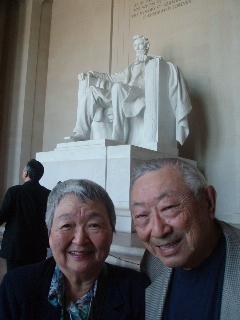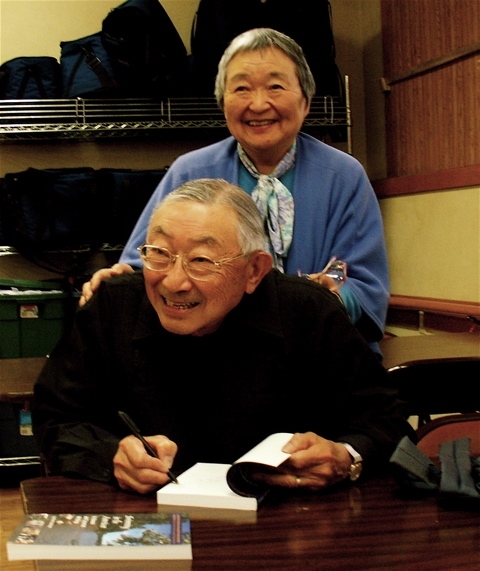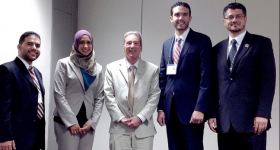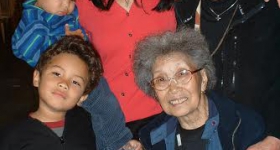Photos courtesy Soji Kashiwagi
When Hiroshi Kashiwagi was a sixth-grader in rural northern California in the 1920s, “What I Did Over the Weekend” time was an exercise in alienation. While his classmates shared thrilling tales of hunting in the woods and visiting scattered relatives for slumber parties, little Hiroshi's stories usually took place in his family’s fish store. He knew his weekend chore wouldn’t make any sense to his classmates: watching the water and soybeans trickle into a stone grinder for tofu-making, back when tofu was a strange and foreign thing.

Hiroshi Kashiwagi and wife Sadako
So he started making up stories. In the fantastic land of his mind, he was a hunter, a hero, a regular boy.
“Where were my relatives? Did I have any at all? Maybe in Japan, but certainly none close by. Some boys told about going fishing and hunting which was boring to me … People listened to them. Why couldn’t I tell a hunting story? But I never went hunting.
One Monday morning when my turn came around, I went up front. Strangely, I felt quite confident as I began, ‘Over the weekend I went hunting with my dog Spot.’ I had never held a gun in my hand, much less shot one, but I had the kids’ rapt attention. No one had heard of Spot either. He was an invention.”
From Swimming in the American: A Memoir and Selected Writings by Hiroshi Kashiwagi
His dreaming confronted harsh reality with the outbreak of World War II. War against Japan meant anti-immigrant resentment focused itself on the nearest target: Japanese Americans. Already misunderstood, the line between Asians and Asian Americans was deliberately blurred when President Roosevelt issued Executive Order 9066 on February 19, 1942, calling for the Secretary of War to “protect against espionage” and avoid “sabotage to national defense material.” In order to “protect America,” both Japanese nationals and American citizens of Japanese descent were ordered imprisoned. The Kashiwagis joined tens of thousands of other families in prison camps across the United States.
Hiroshi was 19 years old, and he describes camp time with a mixture of wonder, playfulness, and terror. His longtime interest in writing and performing found an outlet in camp, where he joined a writers club and tested out his material in front of an all-Japanese American audience (reaction: underwhelmed). Still, he persevered, hoping to become an actor for stage and screen.

Hiroshi and Sadako Kashiwagi
Racism in the film industry was a constant obstacle, as was ostracization by a sector of the Japanese American community that disagreed with one choice he had made in camp: he refused to answer a so-called “loyalty questionnaire” issued during the war by the US government. That questionnaire included two questions:
Question #27:
Are you willing to serve in the armed forces of the United States on combat duty, wherever ordered?
Question #28:
Will you swear unqualified allegiance to the United States of America and faithfully defend the United States from any and all attack by foreign or domestic forces, and forswear any form of allegiance to the Japanese Emperor or any other foreign government, power, or organization?
From the “Statement of United States Citizenship of Japanese Ancestry”
Those that responded in any way besides “yes, yes” were branded “No-No Boys,” and called disloyal, traitors and worse. At a time when suspicions were high and the American-ness of Japanese Americans was constantly being questioned, anything less than two yeses was seen by some as contributing to the confusion. Still, Hiroshi refused to answer the questionnaire.
My position was this -- why was I, an American citizen, thrown in prison without cause, without due process? Why were they questioning my loyalty? I was an American, a loyal American. If they restored my status as a rightful citizen, let me go free, out of this prison, I would do anything required of me. Why should I answer the ambiguous questions? I would follow my conscience and refuse to register.
From Swimming in the American: A Memoir and Selected Writings by Hiroshi Kashiwagi
After camp, Hiroshi went on to receive a BA from UCLA and a MA from UC Berkeley. He married Sadako Nimura, raised three sons, and worked as a librarian for the San Francisco Public Library and for the Buddhist church. On the side, he continued to write poems and plays.
He also joined the redress movement, testifying before the Commission on Wartime Relocation and Internment of Civilians in San Francisco in 1981, part of the long process which eventually led to an official government apology to Japanese Americans and redress payments in 1988. He joined other camp survivors to initiate Tule Lake Pilgrimage, an intergenerational educational trip to the former Tule Lake War Relocation Center near the California-Oregon border (I am a member of the current volunteer committee). Now age 88, he returns to Tule Lake every two years to read his poetry, earning him the unofficial title “Poet Laureate of Tule Lake.”
Tule Lake Monuments
dust storms
frequent
powerful
relentless
we endured
we survived
our spirits
unyielding
ultimately
triumphant
From Ocean Beach (poems), Asian American Curriculum Project (2010)
Through writing, performing, and publishing, Hiroshi has been able to share his understanding of what it means to be American, and broaden our vision of ours. This month he visited Washington, DC for the first time to attend the Night of Poetry at the White House, where he met the president and first lady and gave them copies of his books. Included in one of them is this funny redux of "What I Did Over The Weekend," truthful this time and full of pride.
Tofu
tofu
white blocks
of bean cake
good
protein food
I know
sure I know
two hours
every day
after school
I spent
grinding soy beans
into a
frothy mess
washtubful
for papa’s
famous
fine-textured
number one
three for a quarter
tofu
good
for you
not for me
too much
of my boyhood
went into
good
protein food
now white folks
now vegetarians
have discovered
tofu
they eat it
praise it
even make it
tofu
good
for you
not for me
the goddamned
tofu
From Swimming in the American: A Memoir and Selected Writings by Hiroshi Kashiwagi
Nina Kahori Fallenbaum is Hyphen’s food and agriculture editor.









Comments